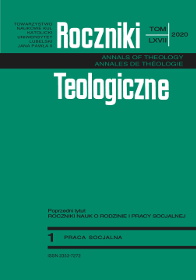H5 Model Concerning Refugee Family Trauma and Recovery and its Application in Social Work Practice – Towards an Improved Refugee Family Assistance. Theoretical and Practical Considerations
Abstrakt
Model H5 dotyczący traumy uchodźczej oraz jego zastosowanie w praktyce pracy społecznej – celem ulepszenia wsparcia rodzin uchodźczych. Rozważania teoretyczne i praktyczne
Autorzy dokonują analizy złożoności zagadnienia godności ludzkiej oraz godności ludzkiej jako koncepcji oraz jej umiejscowienia w ramach dzisiejszych form i praktyk pracy społecznej. W związku z tym autorzy rozważają tematykę pojmowania godności ludzkiej, w tym godności ludzkiej jako wartości społeczno-prawnej, jej istotności dla pracy społecznej w ogóle oraz z racji podstawowych wartości relewantnych dla pracy społecznej. Autorzy egzaminują ewolucję podejść pracy społecznej wobec godności ludzkiej koncentrując się na działalności organizacji międzynarodowych, ich członków stowarzyszonych i partnerów związanych z pracą społeczną, których zadaniem m.in. jest promować oraz dbać o przestrzeganie wartości godności ludzkiej w dostarczaniu codziennych praktyk i usług pracy społecznej.
Bibliografia
Baker, C.N., Brown, S.M., Wilcox, P.D., Overstreet, S., Arora, P. “Development and Psychometric Evaluation of the Attitudes Related to Trauma-Informed Care (Arctic) Scale.” School Mental Health (2016), 8, 1: 61–76.
Brandmeier, M., Kruse, J. “Trauma und Asyl in Flȕchtchlingsrecht in Theorie and Praxis: 5 Jahre Refugee Law Clinic an der Justus-Liebig-Universitȁt Giessen, In P. Tiedemann, J. Gieseking, Flȕchtlingsrecht in Theorie und Praxis. Baden Baden, 2014.
Brown, S.M., Baker, C.N., Wilcox, P. “Risking Connection Trauma Training, A Pathway Toward Trauma-Informed Care in Child Congregate Care Settings.” Psychological Trauma: Theory, Research, Practice (2012), 4, 5: 507–515.
Carlson, E.A., Sroufe, L.A. “Contribution of Attachment Theory to Developmental Psychopathology.” In D. Cichhetti, D.J. Cohen (eds.), Developmental Psychopathology. Vol I. Theory and Methods, 581–617. Oxford, 2014.
Congress, E.P. “The Culturagram.” In A. Roberts, Social Work Desk Reference, 969–973. New York–Oxford, 2008.
Congress, E.P. “The Culturagram.” In K. Corcoran, A.R. Roberts. Social Worker’s Desk Reference. New York, 2015.
Das, M. “Ecological Integrative Body-Mind-Spirit Approaches Within Conflict – Induced Displacement.” In M.Y. Lee, C.H.Y. Chan, C.L.W. Chan, S.M. Ng, P.P.Y. Leung. Integrative Body-Mind-Spirit Social Work An Empirically Based Approach to Assessment and Treatment, 270–279. Oxford–New York, 2018.
Elliott, D.E., Bjelajac, P., Fallot, R.D, Markoff, L.S. “Trauma-Informed or trauma-denied. Principles and Implementation of Trauma Informed Services for Women.” Journal of Community Psychology (2005), 33, 4: 461–477.
Fallot, R.D., Harris, M. “Creating Cultures of Trauma-Informed Care (CCTIC), A Self-Assessment and Planning Protocol.” Community Connections, April 2009, 1–19.
Hilado, A., Lundy, M. Models for Practice with Refugees and Immigrants, Collaboration, Cultural Awareness and Integrative Theory. Los Angelos–London, 2018.
Jackson, K. “Treating Trauma in American Refugees.” Social Work Today (2016), 16, 4: 10.
Jovev, M., Jackson, H.J. “Early Maladaptive Schemas in Personality Disordered Individuals.” Journal of Personality Disorders (2004), 18, 5: 467–486.
Levenson, J.S. “Trauma- Informed Social Work Practice.” Social Work (2017), 62, 2: 1–9.
Miller, W.R., Rollnick, S. “Ten Things that Motivational Interviewing is not.” Behavioural and Cognitive Psychotherapy (2009), 37, 2: 129–140.
Miller, W.R., Yahne, C.E., Moyers, T.B., Martinez, J., Pirritano, M. “A randomized trial of methods to help clinicians learn motivational interviewing.” Journal of Consulting and Clinical Psychology (2004), 72: 1050–1062.
Mollica, R.F. The new H5 model, Trauma and Recovery. Harvard, 2014.
Mollica, R.F., Brooks, D.R., Ekblad, S., McDonald L. “The H5 New Model of Refugee Trauma and Recovery.” In J. Lindert, I. Levav (eds.). Violence and Mental Health, Its Manifold Faces, 341–378. New York–London, 2015.
Mollica, R.F., Bollini, P., Caspi, Y., Truong, T. “Harvard Trauma Questionnaire; Validating a Cross-Cultural Instrument for Measuring torture, Trauma, and Posttraumatic Stress Disorder in Refugees.” Journal of Nervous & Mental Disease (1994), 180, 2: 107–111.
Pathways to Wellness. Refugee Health Screener 15 (RHS 15). Washington, 2011.
Potocky, M., Guskovict, K.L. “Enhancing Empathy among Humanitarian Workers through Project Miracle: Development and Initial Validation of the Helpful Responses to Refugee Questionnaire.” Torture (2016), 26, 3: 46–59.
Schauer, M., Neuer, F., Elbert, T. Narrative Exposure Therapy: A Short Term Treatment for Traumatic Stress Disorders. Cambridge, 2002.
Sudbury, J. “Key features of therapeutic social work: The use of relationship.” Journal of Social Work Practice (2002), 16, 2: 142–162.
Teyber, E., McClure, F. Interpersonal processes in therapy. An Integrative Model. Belmont, 2011.
Copyright (c) 2020 Roczniki Teologiczne

Utwór dostępny jest na licencji Creative Commons Uznanie autorstwa – Użycie niekomercyjne – Bez utworów zależnych 4.0 Międzynarodowe.





